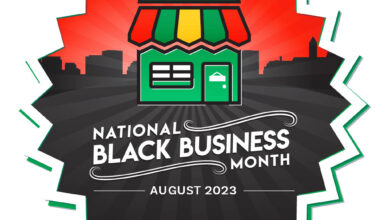SBA loans to Black businesses rise in state, region, nation

The amount of money from bank loans backed by the U.S. Small Business Administration going to Black-owned businesses in the past year increased significantly in Massachusetts, New England and the country, the federal agency reports.
In Massachusetts, SBA-guaranteed loans to Black businesses rose to nearly $30 million in the federal fiscal year that ended Sept. 30, a whopping increase of almost 150%, or $18 million, from the year before, according to Bob Nelson, the agency’s director for the state.
The increases in loan dollars in the surrounding region, 81%, and the country, 27%, were not as large but still substantial, according to Nelson, who doubles as acting regional administrator, and Isabel Guzman, the SBA administrator in Washington, D.C.
The greater flow in loan dollars to Black businesses helps address one of their greatest challenges — securing access to funding to start up or expand. Nelson and the SBA attributed the growth to a record jump in Black businesses forming, changes in lending rules and the agency’s outreach efforts.
“The Biden administration is trying to make sure there are access and opportunity. We absolutely know there have been gaps” in lending, Nelson said.
Steven Rogers, a retired Harvard Business School professor, said he was “absolutely elated” to learn of the recent trend in SBA-backed lending.
“But, interestingly, I would say it’s somewhat bittersweet,” said Rogers, who taught courses in entrepreneurial finance. “It’s sweet in the sense that it’s improved. (But) the reason the numbers are so impressive is because the base was so low.”
In fiscal year 2022, the SBA guaranteed 56 loans to Black enterprises in Massachusetts and another 60 to ones in the rest of New England, according to data that Nelson provided. In the next year, the comparable figures rose to 100 in the state and an additional 97 in the other five states in the region.
Rogers disagreed with SBA data on how low its guaranteed lending had been several years ago to Black businesses nationally, a figure based on another metric, the share of such loans that went to them. A Harvard Business School paper he wrote said it was less than 2% in 2017; the agency said it was close to 4%.
His point about a low baseline, however, “still fits,” Rogers said, even if it was closer to 4% as the SBA says.
The SBA’s latest data puts Black businesses’ share nationally at 7.6%. Rogers estimated 7%-8% of the country’s entrepreneurs are Black.
“It’s getting close to what we are in the numbers,” he said.
In an Oct. 23 news release, the SBA cited an increase in demand, “with the rate of Black-owned small business creation at its highest level in 25 years.”
Nelson added in a telephone interview, “We know that a lot of minority businesses are starting, whether it’s Latino or Black.” The SBA-backed lending to Latino businesses also rose nationwide in the last fiscal year, the agency has reported.
He said the latest data show 35% of the SBA loan approvals for Black businesses in Massachusetts went to businesses that were two years old or less. The same percentage were owned by Black women.
The loans, which Nelson said tend to be $500,000 or less, went primarily to businesses that provide services. Health-related enterprises were the most common. Middlesex, Worcester, Suffolk and Norfolk counties were the top locations of Black businesses that received SBA-backed loans in the state.
TD Bank and Eastern Bank led in SBA lending to Black businesses in Massachusetts, he said. Bank of America, which dominates in the Boston area, did not make the list of the top four banks he cited.
Rule changes that appear to have benefitted Black applicants for SBA-backed loans, Nelson said, include dropping the 1 percentage point fee for loans under $500,000, streamlining the lending process for amounts at that level and require less detail from applicants about any criminal history.
Nelson said outreach has also figured in the statewide increase.
“My team here in Massachusetts — we do a tremendous amount of marketing, research and training for small businesses,” he said, engaging in “capital matchmaking” with lenders.
Rogers said the increase in SBA lending to Black businesses benefits more than the business owners.
“Our Black-owned businesses desperately need money, capital,” he said. “The country needs Black-owned businesses to have capital because they hire Black people.”
























































